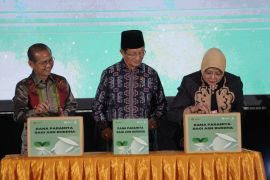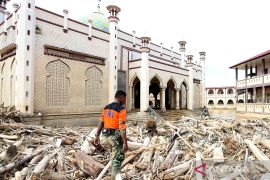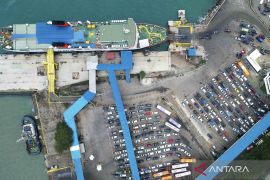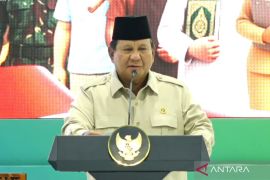The trend has been obvious from 2017 although not yet as fast as expected. In 2018, exports, which have long been in the doldrums, are expected to give more significant contribution to the country`s economic growth.
The optimism followed commodity price hike. Coal and mineral prices are on the increase with stronger demand from China, the world`s second largest economy.
Foreign direct investment and portfolio investment are also expected to continue to increase especially as international rating agencies have raised the Indonesian credit rating.
All three major international rating agencies Fitch Ratings, Moody`s Investors Service and Standard and Poor`s have given Indonesia the investment grade status. Fitch Ratings even already raised the rating of the Indonesian foreign debts to BBB/"outlook stable" from "BBB-/outlook positive".
The International Monetary Fund (IMF) predicted that Indonesia`s economy would grow 5.3 percent in 2018; Bank Indonesia predicted a growth of 5.1-5.5 percent and the government sets a growth target of 5.4 percent.
However, the year 2018 is not an easy year. Political tension is feared to mount with regional elections to be held simultaneously all over the country that year, to be followed with legislative and presidential elections in 2019.
There would be 171 regional elections including 17 elections for provincial governors such as in East Java, West Java and Central Java, and the rest are elections for heads of district and city administrations.
Expansion in 2018
Senior Deputy Governor of Bank Indonesia (BI) Mirza Adityaswara dismissed fear of the political impact on economy in 2018 and called for more aggressive expansion by the business sector.
He said it is not the first time the country holding elections and the economy had continued to go its way, adding a number of indicators showed that purchasing power of the people increased.
Meanwhile, Coordinating Minister for Economy Darmin Nasution said instead of a threat to economic stability, the regional elections in 2018 could be a blessing to the economy.
The 171 regional elections in 2018 would increase household consumption, which has been the main driver of the country`s economic growth amid the slump in the trade and manufacturing sector in the past several years, Darmin said.
"General elections have always brought about positive impact on the economy," he said.
He predicted the regional elections and the Asian Games to be hosted by Indonesia in the same year could contribute to the country`s economic growth by 0.2-0.3 percentage points.
Mirza said larger government spending would help drive the country`s economic growth but the main drivers should be household consumption, exports and investment.
In addition, the country`s banking industry already wrapped up the process of internal consolidation that banks would ready to embark on big financing projects in the business sector, he said.
He predicted that bank credits would grow around 10-12 percent yoy in 2018. The OJK also has the same target for bank credit growth.
The country`s macro economic indicators continued to improve at least until the third quarter of this year.Inflation was kept at 3.7 percent yoy. Bank Indonesia even predicted the inflation to fall below the target at 3 percent -3.5 percent yoy.
Finance Minister Sri Mulyani said the country`s economic performance toward the end of 2017 could give a momentum for a more positive economic growth in 2018.
"If the momentum of Indonesian economic growth is positive and solid, inflatyion and exchange rate would remain stable, and this would provide a much better position in facing uncertainties," the minister said.
She said the momentum of the country to chalk up a stronger and healthier economic growth in 2018 is greater than in previous years thanks partly to global trade recovery.
"In 2017, the momentum of global economic growth began to pick up as indicated by the volume of global trade which rose from 2.2 percent in 2016 to 4 percent in 2017. Certainly with a 4 percent growth the global economy has not yet fully recovered but it is a strong momentum," she said.
In order to maintain the growth momentum, the government would take a number of initiatives, such as by optimizing the management and spending of the state budget (APBN) funds to reach the goals of development, she said.
"Sometimes we forget that we see APBN as a goal. APBN is not a goal, APBN is an instrument. We will continue to make APBN as a healthy, credible, and effective instrument," she said.
She said the government would carry on with the process of reformation in state revenues both tax and non tax state revenues to strengthen and revitalize the economy.
She went on to say, debt management would be with great prudence by keeping the sustainability and credibility of APBN that it would give positive impact on development.
"With strong and healthy APBN instrument, we could hope Indonesian economy would continue to be with positive momentum," she said.
Chief economist of PT Manulife Aset Manajemen Indonesia (MAMI) Katarina Setiawan said conducive condition of global economy ahead of the election years in 2018 and 2019 could give significant contribution to the country`s economic growth.
Three previous periods of general elections starting in 2004 were much different from the forthcoming elections. In addition, there is synchronization of economic growth between advanced and developing nations.
Conducive global situation would greatly contribute to Indonesia`s economic development allowing the government to focus more on reaching its economic targets such as in infrastructure and elimination of poverty.
(T.SYS/B/H-ASG/F001)
Reporter: Indra Arief Pribadi/A. Saragih
Editor: Heru Purwanto
Copyright © ANTARA 2017












